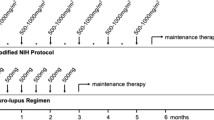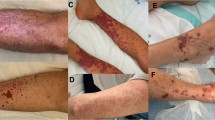Abstract
An association between infections and antiphospholipid antibodies (aPL) has been reported in several epidemiologic and experimental studies. Infection-induced aPL have been traditionally regarded as transient and were generally not associated with clinical features of antiphospholipid syndrome. The distinction between autoimmune and postinfectious aPL on the basis of requirement of binding cofactor is not absolute, and in recent years, several reports demonstrated that some patients can produce pathogenic antibodies in response to infection. Infections most frequently associated with antiphospholipid syndrome include parvovirus B19, cytomegalovirus, varicella-zoster virus, HIV, streptococcal and staphylococcal infections, gram-negative bacteria, and Mycoplasma pneumoniae.
Similar content being viewed by others
References and Recommended Reading
Levine JS, Branch DW, Rauch J: The antiphospholipid syndrome. N Engl J Med 2002, 346:752–763.
Cervera R, Asherson RA, Acevedo ML, et al.: Antiphospholipid syndrome associated with infections: clinical and microbiological characteristics of 100 patients. Ann Rheum Dis 2004, 63:1312–1317.
Shoenfeld Y, Blank M, Cervera R, et al.: Infectious origin of the antiphospholipid syndrome. Ann Rheum Dis 2006, 65:2–6.
Luong TH, Rand JH, Wu XX, et al.: Seasonal distribution of antiphospholipid antibodies. Stroke 2001, 32:1707–1711.
Avcin T, Ambrozic A, Kuhar M, et al.: Anticardiolipin and anti-beta2 glycoprotein I antibodies in sera of 61 apparently healthy children at regular preventive visits. Rheumatology 2001, 40:565–573.
McNally T, Purdy G, Mackie IJ, et al.: The use of an anti-beta2-glycoprotein-I assay for discrimination between anticardiolipin antibodies associated with infection and increased risk of thrombosis. Br J Haematol 1995, 91:471–473.
Asherson RA, Cervera R, Piette JC, et al.: Catastrophic antiphospholipid syndrome: clues to the pathogenesis from a series of 80 patients. Medicine 2001, 80:355–377.
Kratz C, Mauz-Körholz C, Kruck H, et al.: Detection of antiphospholipid antibodies in children and adolescents. Pediatr Hematol Oncol 1998, 15:325–332.
Frauenknecht K, Lackner K, von Landenberg P: Antiphospholipid antibodies in pediatric patients with prolonged activated partial thromboplastin time during infection. Immunobiology 2005, 210:799–805.
Vaarala O, Palosuo T, Kleemola M, Aho K: Anticardiolipin response in acute infections. Clin Immunol Immunopathol 1986, 41:8–15.
Von Landenberg P, Lehmann HW, Knoll A, et al.: Antiphospholipid antibodies in pediatric and adult patients with rheumatic disease are associated with parvovirus B19 infection. Arthritis Rheum 2003, 48:1939–1947.
Loizou S, Cazabon JK, Walport MJ, et al.: Similarities of specificity and cofactor dependence in serum antiphospholipid antibodies from patients with human parvovirus B19 infection and from those with systemic lupus erythematosus. Arthritis Rheum 1997, 40:103–108.
Kalt M, Gertner E: Antibodies to beta2-glycoprotein I and cardiolipin with symptoms suggestive of systemic lupus erythematosus in parvovirus B19 infection. J Rheumatol 2001, 28: 2335–2336.
Reitblat T, Drogenikov T, Sigalov I, et al.: Transient anticardiolipin antibody syndrome in a patient with parvovirus B19 infection. Am J Med 2000, 109:512–513.
Asano Y, Sarukawa M, Idezuki T, et al.: Multiple small pulmonary emboli associated with transitient antiphospholipid syndrome in human parvovirus B19 infection. Clin Rheumatol 2006, 25:585–587.
Labarca JA, Rabaggliati RM, Radrigan FJ, et al.: Antiphospholipid syndrome associated with cytomegalovirus infection: case report and review. Clin Infect Dis 1997, 24:197–200.
Uthman I, Tabbarah Z, Gharavi AE: Hughes syndrome associated with cytomegalovirus infection. Lupus 1999, 8:775–777.
Delbos V, Abgueguen P, Chennebault JM, et al.: Acute cytomegalovirus infection and venous thrombosis: role of antiphospholipid antibodies. J Infect 2007, 54:e47–50.
Viseux V, Darnige L, Carmi E, et al.: Pulmonary embolism and transitory anti-beta2-GPI antibodies in an adult with chicken pox. Lupus 2000, 9:558–560.
Van Hal S, Senanayake S, Hardiman R: Splenic infarction due to transient antiphospholipid antibodies induced by acute Epstein-Barr virus infection. J Clin Virol 2005, 32:245–247.
Losurdo G, Giacchino R, Castagnola E, et al.: Cerebrovascular disease and varicella in children. Brain Dev 2006, 28:366–370.
Manco-Johnson MJ, Nuss R, Key N, et al.: Lupus anticoagulant and protein S deficiency in children with postvaricella purpura fulminans or thrombosis. J Pediatr 1996, 128:319–323.
Campanelli A, Kaya G, Ozsahin AH, et al.: Purpura fulminans in a child as a complication of chickenpox infection. Dermatology 2004, 208:262–264.
Ordi-Ros J, Villarreal J, Monegal F, et al.: Anticardiolipin antibodies in patients with chronic hepatitis C virus infection: characterization in relation to antiphospholipid syndrome. Clin Diagn Lab Immunol 2000, 7:241–244.
Dalekos GN, Kistis KG, Boumba DS, et al.: Increased incidence of anti-cardiolipin antibodies in patients with hepatitis C is not associated with aetiopathogenetic link to anti-phospholipid syndrome. Eur J Gastroenterol Hepatol 2000, 12:67–74.
Zachou K, Liaskos C, Christodoulou DK, et al.: Anti-cardiolipin antibodies in patients with chronic viral hepatitis are independent of beta2-glycoprotein I cofactor or features of antiphospholipid syndrome. Eur J Clin Invest 2003, 33:161–168.
Muñoz-Rodríguez FJ, Tassies D, Font J, et al.: Prevalence of hepatitis C virus infection in patients with antiphospholipid syndrome. J Hepatol 1999, 30:770–773.
Harada M, Fujisawa Y, Sakisaka S, et al.: High prevalence of anticardiolipin antibodies in hepatitis C virus infection: lack of effects on thrombocytopenia and thrombotic complications. J Gastroenterol 2000, 35:272–277.
Ertem D, Acar Y, Pehlivanoglu E: Autoimmune complications associated with hepatitis A virus infection in children. Pediatr Infect Dis J 2001, 20:809–811.
Guglielmone H, Vitozzi S, Elbarcha O, Fernandez E: Cofactor dependence and isotype distribution of anticardiolipin antibodies in viral infections. Ann Rheum Dis 2001, 60:500–504.
Bloom EJ, Abrams DI, Rodgers G: Lupus anticoagulant in the acquired immunodeficiency syndrome. JAMA 1986, 256:491–493.
De Larranaga GF, Forastiero RR, Carreras LO, Alonso BS: Different types of antiphospholipid antibodies in AIDS: a comparison with syphilis and the antiphospholipid syndrome. Thromb Res 1999, 96:19–25.
Hassoun A, Al-Kadhimi Z, Cervia J: HIV infection and antiphospholipid antibody: literature review and link to the antiphospholipid syndrome. AIDS Patient Care STDS 2004, 18:333–340.
Shah I, Chudgar P: Antiphospholipid syndrome in a human immunodeficiency virus 1-infected child. Pediatr Infect Dis J 2006, 25:185–186.
Smith KJ, Skelton HG, Yeager J, Wagner KF: Cutaneous thrombosis in human immunodeficiency virus type 1-positive patients and cytomegalovirus viremia. Arch Dermatiol 1995, 131:357–358.
Petrovas C, Vlachoyiannopoulos PG, Kordossis T, Moutsopoulos HM: Anti-phospholipid antibodies in HIV infection and SLE with or without anti-phospholipid syndrome: comparisons of phospholipid specificity, avidity and reactivity with beta2-GPI. J Autoimmun 1999, 13:347–355.
Ardiles L, Ramirez P, Moya P, et al.: Anticardiolipin antibodies in acute poststreptococcal glomerulonephritis and streptococcal impetigo. Nephron 1999, 83:47–52.
Figueroa F, Berrios X, Gutierrez M, et al.: Anticardiolipin antibodies in acute rheumatic fever. J Rheumatol 1992, 19:1175–1180.
Ilarraza H, Marquez MF, Alcocer A, et al.: Anticardiolipin antibodies are not associated with rheumatic heart disease. Lupus 2001, 10:873–875.
Snowden N, Wilson PB, Longson M, Pumphrey RS: Antiphospholipid antibodies and Mycoplasma pneumoniae infection. Postgrad Med J 1990, 66:356–362.
Bakshi M, Khemani C, Vishwanathan V, et al.: Mycoplasma pneumonia with antiphospholipid antibodies and a cardiac thrombus. Lupus 2006, 15:105–106.
Witmer CM, Steenhoff AP, Shah SS, Raffini LJ: Mycoplasma pneumoniae, splenic infarct, and transient antiphospholipid antibodies: a new association? Pediatrics 2007, 119:e292–295.
Goldenberg NA, Knapp-Clevenger R, Hays T, Manco-Johnson MJ: Lemierre’s and Lemierre’s-like syndromes in children: survival and thromboembolic outcomes. Pediatrics 2005, 116:543–548.
Hojnik M, Gilburd B, Ziporen L, et al.: Anticardiolipin antibodies in infections are heterogenous in their dependency on beta2-glycoprotein I: analysis of anticardiolipin antibodies in leprosy. Lupus 1994, 3:515–521.
De Larranaga GF, Forastiero RR, Martinuzzo ME, et al.: High prevalence of antiphospholipid antibodies in leprosy: evaluation of antigen reactivity. Lupus 2000, 9:594–600.
Consigny PH, Cauquelin B, Agnamey P, et al.: High prevalence of co-factor independent anticardiolipin antibodies in malaria exposed individuals. Clin Exp Immunol 2002, 127:158–164.
Santiago M, Martinelli R, Ko A, et al.: Anti-beta2 glycoprotein I and anticardiolipin antibodies in leptospirosis, syphilis and Kala-azar. Clin Exp Rheumatol 2001, 19:425–430.
Martinuc-Porobic J, Avcin T, Bozic B, et al.: Anti-phospholipid antibodies following vaccination with recombinant hepatitis B vaccine. Clin Exp Immunol 2005, 142:377–380.
Tarjan P, Sipka S, Lakos G, et al.: Influenza vaccination and the production of anti-phospholipid antibodies in patients with systemic lupus erythematosus. Scand J Rheumatol 2006, 35:241–249.
Mormile R, D’Alterio V, Treccagnoli G, Sorrentino P: Henoch-Schonlein purpura with antiphospholipid antibodies after influenza vaccination: how fearful is it in children? Vaccine 2004, 23:567–568.
Blank M, Asherson RA, Cervera R, Shoenfeld Y: Antiphospholipid syndrome infectious origin. J Clin Immunol 2004. 24:12–23.
Blank M, Krause I, Fridkin M, et al.: Bacterial induction of autoantibodies to beta2-glycoprotein-I accounts for the infectious etiology of antiphospholipid syndrome. J Clin Invest 2002, 109:797–804.
Gharavi AE, Pierangeli SS, Espinola RG, et al.: Antiphospholipid antibodies induced in mice by immunization with cytomegalovirus-derived peptide cause thrombosis and activation of endothelial cells in vivo. Arthritis Rheum 2002, 46:545–552.
Raschi E, Testoni C, Bosisio D, et al.: Role of the MyD88 transduction signaling pathway in endothelial activation by antiphospholipid antibodies. Blood 2003, 101:3495–3500.
Pierangeli SS, Vega-Ostertag ME, Raschi E, et al.: Toll like receptor 4 is involved in antiphospholipid-mediated thrombosis: in vivo studies. Ann Rheum Dis 2007, in press.
Author information
Authors and Affiliations
Corresponding author
Rights and permissions
About this article
Cite this article
Avčin, T., Toplak, N. Antiphospholipid antibodies in response to infection. Curr Rheumatol Rep 9, 212–218 (2007). https://doi.org/10.1007/s11926-007-0034-x
Published:
Issue Date:
DOI: https://doi.org/10.1007/s11926-007-0034-x




